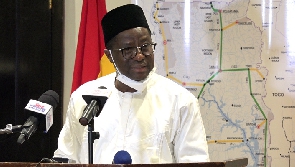Business News of Wednesday, 21 March 2012
Source: GNA
Blueprint for developing mining communities should be established
EcoPioneers Ghana, a Non Governmental Organisation (NGO), has advocated for a town-specific non-negotiable blueprint for the development of mineral or oil rich communities in Ghana.
A statement issued by Mr Iddrisu Siddiq, Director of EcoPioneers in Accra on Tuesday, said the blueprint could be developed in consultation with the local political and traditional authorities, technocrats, youths and civil society groups within the communities.
In addition, it should be the grand plan for the economic and social development of each mining community and out of the plan should identify specific projects that needed to be in place to ensure sustainable growth and development in the community.
It said mining and other companies in the extractive industries must be made partners in this plan of development and be obliged to contribute to its implementation.
"This partnership must be the next most important legal document after the Environmental Assessment Plan to which the investors must append their signature and based upon whose implementation they must be assessed in the Akoben Rating of the Environmental Protection Agency (EPA)."
The statement noted that benefits of mining depended on systematic and long range physical, social and economic planning because mining was a long term industry which could serve as a dependable catalyst for national development because of its multiple skills and technology required.
“Our proposed blueprint would establish the principles of development with emphasis on development within communities hosting companies that were engaged in the extractive industries,” it added.
“We are aware that one of the greatest banes in many mining communities is the inability of government to envision the benefits of mining.”
EcoPioneers Ghana was established to compel governments, state institutions and corporate organisations in Ghana to pursue policies and adopt production strategies that would meet the needs of the present without compromising the future in sustaining development. **
Entertainment









